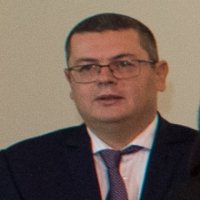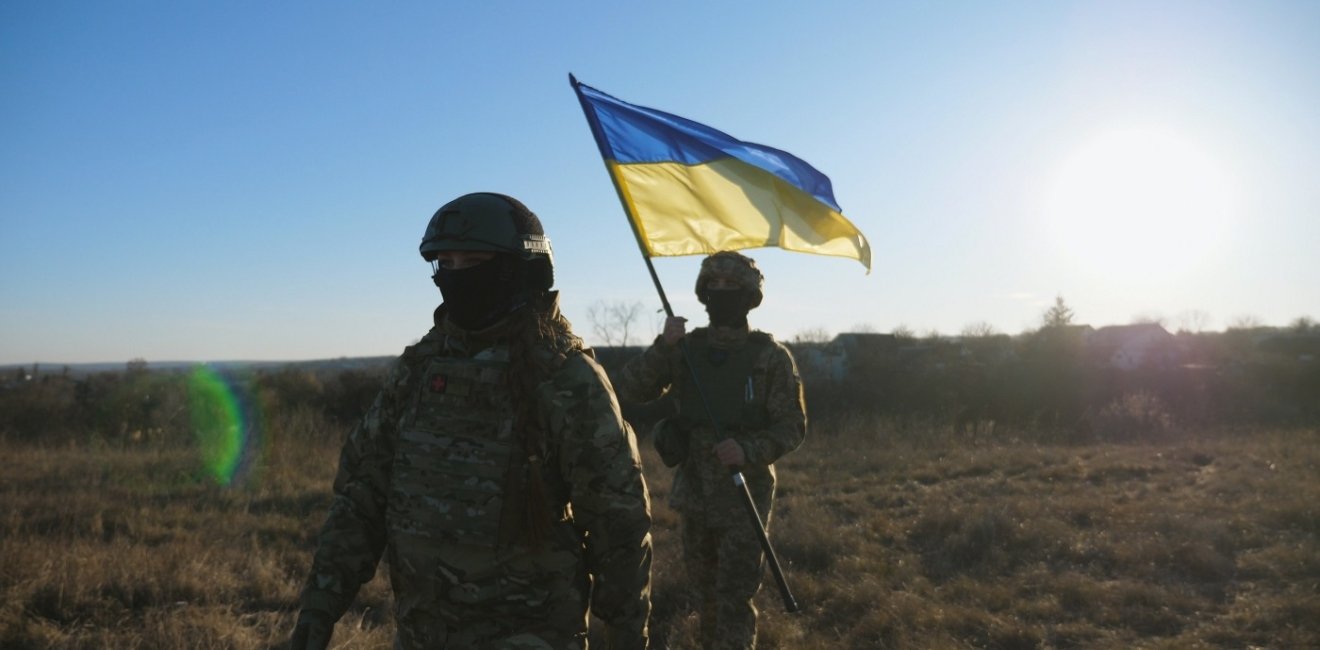On August 24, Ukraine marks 33 years of its independence. As the country continues to fend off Russia's ongoing military aggression, international support, especially from the West, remains crucial. To showcase Wilson Center's ongoing policy work on Ukraine and its free, prosperous and secure future in Europe, a diverse group of Kennan Institute and Global Europe Program experts closely following the war, Ukraine, and the security environment of Europe provide their analysis and insights.
Mykola Bielieskov, Research Fellow, National Institute for Strategic Studies and Senior Analyst, Ukrainian NGO “Come Back Alive”
The 33rd anniversary of Ukrainian statehood coincides with another more tragic milestone – 30 months of Russia’s all-out war of aggression against Ukraine. This is the third Independence Day Ukraine celebrates while fighting an existential war against Russia, Despite Russia’s military losses, estimated at 500,000, it continues to pursue its end goal of destroying Ukrainian statehood.
Looking back, the Ukrainian society and Ukraine’s defense forces have a lot to be proud of. Instead of a quick and easy victory over Ukraine, Russian forces are still unable to take control of territories Russia illegally annexed in September 2022. Ukraine has demonstrated military proficiency and strategic boldness in its recent offensive in the Russian region of Kursk. Ukrainian navy, security service, and military intelligence have managed to ensure freedom of navigation in the Black Sea, while ushering in the era of unmanned surface vehicles combat. In parallel, the Ukrainian Air Force started the process of transitioning to F-16 fighter jets, which began arriving in July 2024, while preventing Russia from establishing air dominance over the Ukrainian air space to the extent possible. Ukrainian indigenous long-range firepower capabilities matured and allowed Ukraine to successfully target Russian military installations and oil depots. Such achievements are even more remarkable given the delay and issues in deliveries of military support coming from the US and Europe.
However, despite all this sacrifice and commitment Ukraine still has not managed to achieve its major strategic goal of making Russia reassess its ability to win the war. Vladimir Putin remains confident that Russia can outlast Western support and, at the same time, undermine domestic unity in Ukraine. Understanding these risks along with the stakes involved should lead to a properly resourced Western strategy towards the war in Ukraine that finally replaces the current unsustainable and outdated ad hoc crisis management. Countries that support Ukraine should demonstrate the necessary commitment to win the war by finally turning latent hard power and technological advantages over Russia into actual battlefield advantages for Ukraine while simultaneously anchoring Ukraine into Euro-Atlantic institutions. Only such an approach can bring a durable settlement to the conflict and derail Russia’s theory of victory. Strategic investment by the West in Ukraine will ultimately be repaid as Ukraine has demonstrated that it can deliver.
Mariana Budjeryn, Fellow, Global Europe Program
On the grand radar of history, 33 years is but a blimp. But for Ukraine, which marks its 33rd year of sovereign statehood on August 24, the past three decades have been marked by relentless change. Since 1991, crises and upheavals shaped Ukraine’s path at least as much as modest periods of stability and growth. Through these trials and tribulations, despite painful post-Soviet economic and political transition that spawned oligarchy and graft, Ukrainians managed to grow a strong and resilient civil society, maintain independent press, and foster political plurality and regular transitions of power, something that proved an exception, rather than a rule in the post-Soviet space.
True, these civic achievements often came at the cost of instability, forged as they were in mass popular protests that rocked the country every few years–the 2004 Orange Revolution and the 2014 Revolution of Dignity being the most notable. Democracy, it turns out, is a messy business. But it was something Ukrainians thought worth fighting for: an open society with an accountable government, a country governed by laws and respect for human rights and freedoms. That most Ukrainians aspire for their country to integrate with Euro-Atlantic structures is a tribute to the kind of model of governance they wish to emulate.
Russia, another post-Soviet state besieged by similar woes, developed along a markedly different trajectory. It is a neo-feudal hierarchy of control over the large country with its immense resources, run by an autocrat who has not relinquished power since he grabbed it 25 years ago and is unlikely to do so in his lifetime. Its society proved either unable and/or unwilling to keep state power accountable, instead becoming a hapless subject of Orwellian brainwashing by state-controlled media. This was the model of governance few Ukrainians wished for their country to follow.
Today, Ukraine is defending itself, at the cost of the lives of its best and bravest, in an existential battle from a country many times bigger and wealthier than Ukraine, simply for daring to take a path different from that of Russia. As we mourn Ukraine’s losses and setbacks and keep a watchful eye on Ukraine’s political leaders, let us not forget that the historical changes ordinary Ukrainians brought about with their determination and resilience in just thirty and three years are nothing short of a miracle.
Tetiana Khutor, Chairwoman of the Institute of Legislative Ideas
In February 2024, a joint assessment estimated Ukraine's reconstruction costs at $486 billion, with potential losses reaching a trillion. Currently, Western and Ukrainian taxpayers bear the financial burden, while the aggressor state and its enablers evade responsibility. Ukraine urgently needs consistent funding, but Western aid has become increasingly unreliable. However, Western countries have the means to hold those responsible accountable.
Using proceeds from frozen Russian assets as collateral for a $50 billion loan is a crucial first step, but it shouldn’t be the last. The goal is to leverage the full $300 billion as the primary source of compensation for victims—anything less would fail to make the aggressor pay.
The war is also fueled by international corporations still operating in Russia, contributing around $20 billion annually in taxes and making them complicit in ongoing atrocities. While 409 businesses have exited Russia, over 2,000 remain, undermining Western support for Ukraine. Forcing these companies to leave the Russian market or imposing a "Continued Operations Sanction Toll" could help offset damages.
Furthermore, investigations into sanction evasion across Europe and the US generate billions in fines and confiscated assets. Allocating a portion of these funds to Ukraine could provide a sustainable financial support source. Implementing these measures would shift the financial burden onto Russia and its enablers, deterring aggression, isolating Russia even more economically, and ensuring that wars of aggression do not go unpunished.
Dr. Iren Marinova, Colorado State University
The full-scale Russian invasion of Ukraine in 2022 caused seismic shifts in the EU’s security and defense landscape. It brought the perceived reality of normative power Europe on a peaceful continent to an end and forced European leaders to turn to introspection on what the EU needs to do to meet the security challenges of the changing geopolitical order. From this introspection it quickly became clear that Ukraine is an indelible part of the European future, and the EU has rallied around this notion over the past two years.
The politics at the EU level following the full-scale invasion highlighted some important deficiencies in the EU’s Common Foreign and Security Policy (CFSP). A glaring one is the stalemate that often occurs when time-sensitive action is needed in response to crises due to the requirements of unanimity voting. As such, the debate for the implementation of a qualified majority voting (QMV) has gained traction once again. QMV in CFSP has been identified by HR Josep Borrell as a high necessity for the EU's ability to act as a geopolitical player and to present a timely unified position on the global stage in times of crisis.
However, the path to QMV is not an easy and clear-cut one, as many member states perceive it as a threat to their national interests. A balance between sovereignty concerns and European unity needs to be found to reassure skeptical member states that their national interests would still be upheld and respected, or what is currently discussed as a “sovereignty safety net,” assuring member states’ ability to impose “enhanced veto options.”
Overall, EU leaders have made it clear that a European future without Ukraine is unconceivable. At the same time, the EU has a challenging road ahead in terms of political will and policy reforms. The CFSP is one policy to keep an eye on as the region powers through the third year of the full-scale invasion and inches towards Ukrainian EU membership.
Oleksandr Merezhko - Member, Ukrainian Parliament
Nowadays Ukraine is going through its “darkest hour”, when its very existence as a sovereign state is at stake. Putin’s ultimate goal is to restore the Soviet empire of evil by depriving Ukrainians of their statehood and national identity through a full-scale imperialist war against Ukraine. It’s also a terrorist war, colonial war and genocidal war against Ukrainian people. At the same time, it would be a mistake to view Russian aggression against Ukraine as merely a war of one state against the other. The truth is that a whole coalition of aggressive totalitarian regimes are enabling this war, including Russia, Belarus, Iran, and North Korea.
The key to Ukraine’s survival is solidarity among the free democratic world and strong American leadership, and the best security guarantee is Ukraine’s membership in NATO. Russia’s propagandistic narrative that it is waging the war of aggression against Ukraine because of “NATO enlargement” not only runs counter international law but also is inherently illogical. To paraphrase George Kennan, the Russian empire can only consider its neighbors as enemies or vassals. The countries bordering Russia want to join NATO not as an act of aggression towards Russia, but because they fear its aggressive and unpredictable behavior. Their only realistic option to preserve their independence is to join the defense alliance.
In order for Russia to stop being a menace to the global order and security, as well as a threat to the independence of its neighbors, it must pursue the path of decolonization, demilitarization and de-putinization. Only these processes will make Europe and the world a safer place.
The past few decades saw the backsliding of democracy around the world and the tangible rise of authoritarianism. To turn this tide, the free world needs a decisive victory of democratic Ukraine over totalitarian, aggressive Russia. This victory would be a victory of freedom over tyranny and of international law over “might makes right” policy, and would considerably strengthen global peace and security by teaching potential aggressors a lesson that international crime doesn’t pay. We can only achieve this victory through our joint efforts.
Mykhailo Minakov - Senior Advisor, Kennan Institute
In 2021, specially for the 30th anniversary of Ukrainian independence, the Kennan Institute’s group of experts published the history of contemporary Ukraine in Ukrainian and English. It was a scholarly text analyzing Ukraine’s development through the lens of its advances in democratic politics, market economy, post-communist society, media pluralism, adaptive identities, etc. Each chapter was written together by at least one Ukrainian and one Western author to match different personal views, academic approaches and cultural perspectives on Ukraine. Published just several months before the major Russian invasion of Ukraine, this history had an open-ended perspective: open for future progress of a culturally diverse, politically resilient and socially dynamic country. Despite the Donbas conflict, Ukrainian society, state, economy and culture were seen in a perspective of a peaceful, better future.
Now, three years later, it is impossible to write such a book. The war has changed the lives and the minds of Ukrainians and their neighbors in the East and the West, the North and the South. All Ukrainian histories and prognostic studies are doomed to comply with the war teleology. Every past or expected event is instantly viewed in a perspective of war: Will it add to the war’s continuation? Will it involve more nations in the conflict? Will they destroy more lives or will it give some hope for peace?
It is a fact: Ukrainian studies are now conditioned by the war perspective. And it does not matter which area a researcher deals with: literature, religion, politics, demography, or economy. This change is seen equally in academic journals and in expert writings.
This can also be seen in the expert blogs of Focus Ukraine. The Wilson Center’s Kennan Institute created this platform seven years ago to bring together American and Ukrainian scholars and analysts studying Ukraine. The topics and tonality of publications before and after February 24, 2022, differ a lot. But they still serve the same aim: to have the dialogue between these communities and to offer deeper understanding of Ukraine for wider audiences in the US.
On its 33rd anniversary, Ukraine will be marked as a resilient society and a fighting state. This society continues learning how to survive in the war of attrition and to cherish the hope for a just peace. The Ukrainian state undergoes ambivalent transformations, acquiring experience of how to fight at the frontline and to invest in its people’s future simultaneously. The anniversary is a right time for citizens and leaders to assess the lessons learned and appreciate their own amazing ability to resist the existential threats with dignity for just another year.
Ukraine does not celebrate the anniversary of its independence alone. Despite all past year’s hesitations, the West did not leave Kyiv alone in the war. It remained a reliable partner in Ukraine’s defense and in the quest for a more stable security system in Eastern Europe.
Blair Ruble - Distinguished Fellow, Kennan Institute
Ukrainian Independence Day has had a bit of a checkered history. Prior to the collapse of the Soviet Union, many Ukrainians abroad chose to celebrate January 22, the day the Ukrainian People’s Republic declared its independence in 1918. In the early 1990s, some chose to honor the anniversary of Ukraine’s Declaration of Sovereignty on July 16. August 24 remained in the running as Ukraine declared independence in 1991 immediately following the failure of the anti-Gorbachev coup. A popular referendum ratified that declaration on December 1, 1991, offering another possible date. Unsurprisingly given this unsure history, few Ukrainians embraced the holiday as particularly noteworthy until 2014, when Russia seized Crimea and touched off puppet breakaway governments in Donetsk and Luhansk.
This story parallels, in many ways, the uncertain trajectory of the Ukrainian state itself. Divisions of language, ethnicity, religion, economic instability, political ideology, political parties that came and went, a parliament seemingly more appropriate for a Gilbert and Sullivan operetta than a twenty-first century state, and rampant corruption captured the attention of the international media. Ukraine’s trajectory often seemed to curve towards failure.
Meanwhile, more out of view than not, new generations of young Ukrainians were growing up with no memory of the Soviet Union, secure in the notion that Russia is a different – and unattractive – country; fluent in Ukrainian no matter what language they spoke a home and drawn to the economic well-being and values of Europe. They had no interest in being drawn into Putin’s “Russian World.” Instead, they created a vibrant Ukrainian culture and identity which enabled them to fashion a genuinely independent Ukraine.
The consolidating moment for Ukraine’s independence came in 2014, when Putin’s aggression prompted many to recognize a profound threat. Russian speaking intellectuals and politicians switched to speaking Ukrainian; many others found a new attachment to Ukraine that had remained dormant. The 2022 full-scale Russian invasion confirmed the existential danger individual Ukrainians faced as they tried to live their lives independent of Russia.
In 2024, few question the importance of Ukraine’s Independence Day. The holiday presaged the formation of a sovereign state. Today, thoughts remain with Ukraine’s defenders and with all who have suffered from the Russian onslaught. Simultaneously, Ukrainians have endless accomplishments worthy of celebration.
Halyna Yanchenko - Member, Ukrainian Parliament; Secretary, National Investment Council of Ukraine; Chair, Temporary Special Commission of the Verkhovna Rada on Protecting Investor Rights
Recently Ukraine marked another "anniversary" of the Russian war of aggression: 900 days of resistance and preservation of Ukrainian statehood in a war of attrition. Even after 900 days of fierce battles, Ukraine’s Armed Forces have proven they can still catch Russia off guard and seize initiative on the battlefield. This is how I can comment on the current situation at the front and general mood on Ukraine’s Independence Day.
The Western world has long considered Russia as a strong and invincible state, but this has turned out to be a myth. Russia is an aggressive country, but not as protected and powerful as its propaganda machine declared. For many years, Russia spent billions of its petrodollars to sustain this myth. Now, in my opinion, this bubble is bursting.
Ukraine has achieved many military victories during 900 days of full-scale war. Many events on the front have become sensations from the perspective of military science and technology, as Ukrainians were the first in the world to accomplish them. For example, for the first time in the world, an A-50 long-range radar detection and control aircraft was destroyed. And within a month, the Armed Forces of Ukraine managed to destroy two such aircraft out of 12 that were in service of Russia. Similarly, the Ukrainian Air Force was the first to intercept a "Kinzhal" ballistic missile, and later a "Tsirkon" hypersonic missile. Both types of missiles were lauded by the Russian authorities as impossible to intercept. For the first time in the world, the missile cruiser "Moskva," a ship of such class and capabilities worth $350 million, was destroyed by a Ukrainian-made "Neptune" missile.
It’s worth emphasizing that during these 900 days of war, Ukraine has done everything possible - and the seemingly impossible - to rebuild its own defense industry. In 2024, the production capacity of Ukraine's defense industrial complex is expected to increase sixfold compared to the pre-war level. However, today Ukraine is capable of producing more weapons than the state can contract during the war due to a lack of budgetary funds.
To date, over 1 million FPV drones produced in Ukraine have been contracted by the state, and in less than two years, the production capacity of drones in Ukraine will be increased to 3 million units per year. The defense industry of Ukraine may become not only the hallmark of the country in the future but also a powerful sector that will ensure economic growth. The launch of several US-Ukrainian defense productions is particularly encouraging in this regard and will bring benefits for both countries.
Of course, Ukraine’s successes on the battlefield also heavily depend on the volume of Western support, primarily military aid. The Ukrainian military has spirit, the will to win, and motivated people. But the aggressor cannot be stopped with bare hands. This is why we have been fighting so desperately all this time to secure the provision of weapons and technologies. Ukraine is grateful to its allies for the support, which allows it to claw back territories from the aggressor.
Support Ukraine, and this will be your best contribution to restoring justice, protecting democracy, and establishing lasting peace in the region. We do not know how many more of these 100-day "anniversaries" will come. We are exhausted, but we continue to fight because, for us, this is a struggle for the existence of our nation. Thus once again I urge our allies to believe in Ukraine. Together, through military superiority and diplomatic pressure from the entire world, we can defeat the aggressor and achieve a just and lasting peace.
Authors


Senior Research Associate, Project on Managing the Atom at the Harvard Kennedy School’s Belfer Center


Postdoctoral Fellow, Johns Hopkins School of Advanced International Studies

Legal Scholar; Member, Verkhovna Rada of Ukraine


Former Wilson Center Vice President for Programs (2014-2017); Director of the Comparative Urban Studies Program/Urban Sustainability Laboratory (1992-2017); Director of the Kennan Institute for Advanced Russian Studies (1989-2012) and Director of the Program on Global Sustainability and Resilience (2012-2014)


Global Europe Program
The Global Europe Program is focused on Europe’s capabilities, and how it engages on critical global issues. We investigate European approaches to critical global issues. We examine Europe’s relations with Russia and Eurasia, China and the Indo-Pacific, the Middle East and Africa. Our initiatives include “Ukraine in Europe”—an examination of what it will take to make Ukraine’s European future a reality. But we also examine the role of NATO, the European Union and the OSCE, Europe’s energy security, transatlantic trade disputes, and challenges to democracy. The Global Europe Program’s staff, scholars-in-residence, and Global Fellows participate in seminars, policy study groups, and international conferences to provide analytical recommendations to policy makers and the media. Read more


Kennan Institute
After more than 50 years as a vital part of the Wilson Center legacy, the Kennan Institute has become an independent think tank. You can find the current website for the Kennan Institute at kennaninstitute.org. Please look for future announcements about partnership activities between the Wilson Center and the Kennan Institute at Wilson Center Press Room. The Kennan Institute is the premier US center for advanced research on Eurasia and the oldest and largest regional program at the Woodrow Wilson International Center for Scholars. The Kennan Institute is committed to improving American understanding of Russia, Ukraine, Central Asia, the South Caucasus, and the surrounding region through research and exchange. Read more

Explore More
Browse Insights & Analysis
The OSCE is a Good Value for America





